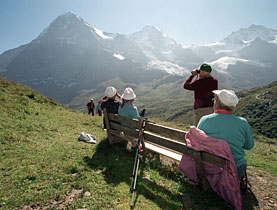Voters have final say on drugs and pension

The Swiss have cast their votes on the government's drugs policy, including the prescription of heroin to addicts, and a proposal to decriminalise cannabis.
Also on the agenda were plans aimed at easing early retirement, tougher legal provisions against paedophiles and moves to curb the powers of environmental organisations.
Polls closed at midday and results are expected shortly.
Of the five issues at stake only the vote on enshrining the government’s four-pillar drugs policy has a realistic chance of winning the necessary majority, experts say.
The official drugs strategy is based on prevention, harm reduction, therapy and repression. It was devised in response to the open drugs scene in Zurich and other Swiss cities during the 1990s.
Supporters, including a majority in parliament and many drugs experts, say the policy has helped reduce the number of drug-related deaths. They argue the prescription of heroin under medical supervision allows addicts to live a more normal life and even integrate into society.
There are about 1,300 registered addicts who benefit from the heroin distribution programme – some of whom later switch to a methadone-supported treatment.
Switzerland was a pioneer in 1999 when it introduced the scheme – restricted initially to a ten-year period.
But opponents, notably in the small ultra-conservative Federal Democratic Union and the rightwing Swiss People’s Party, challenged parliament’s decision to a referendum. They say the official policy has failed to reduce the number of addicts and leaves them in dependency, instead of promoting abstinence-based methods.
Dope
A separate plan, supported by centre-left and some centre-right parliamentarians, seeks to decriminalise hallucinogenic hemp for personal consumption, while trade and cultivation would be subject to state control in an effort to limit access for minors.
“Bans are the worst form of health prevention,” said Christian-Nils Robert, professor of law at Geneva University.
The initiative was launched in the wake of parliament’s refusal in 2004 to adapt legislation to widespread practice.
An estimated 500,000 people in Switzerland say they regularly or occasionally smoke dope.
Opponents warn of the health hazards for cannabis consumers and fear Switzerland would attract hemp consumers from across Europe.
Ten years ago Swiss voters rejected a proposal to decriminalise cannabis.
Pensions
Trade union plans to introduce a flexible retirement from age 62 are the latest attempt to reform the state pension scheme. The scheme has also been under review by parliament as it tries to secure the long-term funding of the social security system.
The unions, backed by the centre-left Social Democrats and the Greens, want to allow people who earn less than SFr120,000 ($99,700) annually to stop working with no loss of benefits.
“A flexible retirement age must no longer be the privilege of high income earners,” said the Trade Union Federation.
At present it is mainly the well-off who take early retirement. The construction industry has also introduced a scheme for employees from age 60.
Men officially retire at 65, while women are eligible for a pension at 64 in Switzerland.
The campaign focused on the costs of the reform with opponents pointing out the risks of the pension system getting out of sync because of the ageing population.

More
Old age insurance
Crime and planning
At stake on Sunday is an initiative by a group of parents aimed at extending indefinitely the statute of limitations for paedophile crimes. Supporters say sexual abuse of minors is often underestimated by the public.
The government and most political parties – except the Swiss People’s Party – have come out against the scrapping of the time limit. They argue it is disproportional and would be difficult to implement.
Currently a person suspected of a paedophile crime can be prosecuted for up to 15 years, or until the victim turns 25.
Parliament agreed a compromise to extend the time frame to the age of 33.
Finally, voters will also decide on a plan by the centre-right Radical Party to curb the powers of environmental groups in major building projects.
The initiative pits the interests of business against those of environmentalists. It was launched in the wake of a legal battle over the construction of a new football stadium in Zurich four years ago.
swissinfo, Urs Geiser
As a rule nationwide votes on changes to the constitution or on new laws take place four times a year.
In February and June 2008 respectively, the Swiss had the final say on proposals for corporate tax breaks and a ban on training flights for the Swiss Air Force over tourist regions, as well as plans to tighten immigration, a reform of the health insurance system and the restriction of government information.
The next nationwide ballot is scheduled for February 2009 when voters will decide on the continuation and extension of a key labour accord with the EU.
Votes and elections also take place in many of the country’s 26 cantons and on a local level this weekend.
The cantonal ballots include plans for the nationwide coordination of the education system for compulsory schooling, as well as state funding for private schools.
Other issues are smoking restrictions in public and a ban on dangerous dogs.
The electorate in the capital Bern chooses a new local parliament and the five-member local council, including the mayor.

In compliance with the JTI standards
More: SWI swissinfo.ch certified by the Journalism Trust Initiative













You can find an overview of ongoing debates with our journalists here . Please join us!
If you want to start a conversation about a topic raised in this article or want to report factual errors, email us at english@swissinfo.ch.